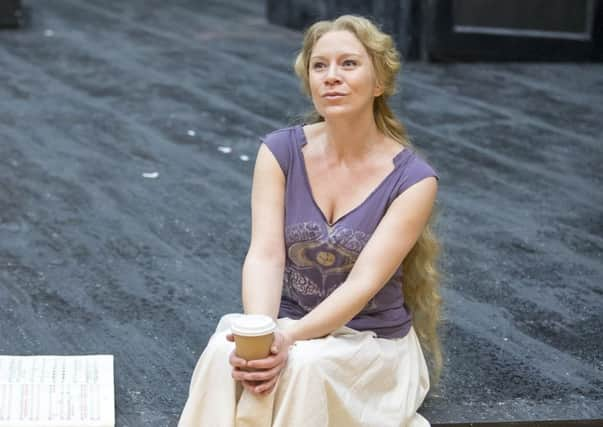Interview: soprano Carolyn Sampson on her starring role in Scottish Opera's Pelléas et Mélisande


Her new challenge – the one for which she’s keen to avoid any waif-like floating – is also with Scottish Opera, and a brand new production of Debussy’s Pelléas et Mélisande directed by Sir David McVicar, a Tristan and Isolde-style love triangle story between the mysterious Mélisande (whom Sampson sings) and the two brothers Golaud and Pelléas – one of whom she marries, and the other of whom she truly loves. You can understand Sampson’s concerns, though: it’s an opera that notoriously works more through suggestion than straightforward directness, implicit rather than explicit, and its beguiling sensuality stems from the very fact that it’s so hard to pin down.
“This is the first time I’ve sung the opera,” Sampson continues, “and actually the first time I’ve got to know the piece closely. My role of Mélisande matches the opera as a whole in that it’s quite mysterious – there are so many ways you could play her. There are productions where she’s manipulative, or where she’s almost a magical figure, or simply a real person – or even where the whole thing is some kind of dream.” How is Sampson approaching the role in McVicar’s production? “There are so many options, but I’d say we’re trying to present the characters as real people, with real emotions.”
Advertisement
Hide AdAdvertisement
Hide AdMcVicar is a revered figure in the world of opera – it was he who staged Scottish Opera’s The Rakes Progress, and his productions have been seen all over the world, from the Met to Glyndebourne to Covent Garden. With such a wealth of experience, does he turn up to rehearsals with his interpretation of Debussy’s elusive masterpiece already fully formed? Sampson says it’s far more of a collaborative process. “David’s very open to our reading of the opera. Sometimes he’ll tell us how a scene should go, but other times we’ll just carry on ourselves and see where we end up. One of the things that makes Pelléas et Mélisande difficult for singers is that the characters’ thought processes continue all the time in the music, so we have to find ways to reflect that. But David comes at everything from the score, so we’re thinking about what’s going on in the music the whole time.”
The role comes hot on the heels of Sampson’s latest disc – settings of French poet Verlaine by Debussy, Ravel and others – although she insists that her recent Debussy focus is just a “happy coincidence”. Indeed, it was very much in early music that Sampson began her career, and that’s a repertoire that she still highly values. “I think I’d say there are two sides to my music, yes. I’ve always had very broad tastes – and certainly, in vocal terms, it was early music that suited me at the start of my career. But it’s always been very important to keep the whole range of what I do, because the different repertoires inform you as a musician in different ways.”
The same goes for the breadth of her performance formats, from the grandeur of the opera stage to intimate recitals with just piano or lute, for example. “They’re entirely different ways of singing, and it’s really important to keep thinking about those things, and questioning how you sing.” It’s that constantly enquiring, thoughtful personality that makes Sampson such a fascinating choice as Debussy’s mysterious heroine. ■
*Scottish Opera’s Pelléas et Mélisande, Theatre Royal, Glasgow, 23 February-4 March; Edinburgh Festival Theatre, 7-11 March